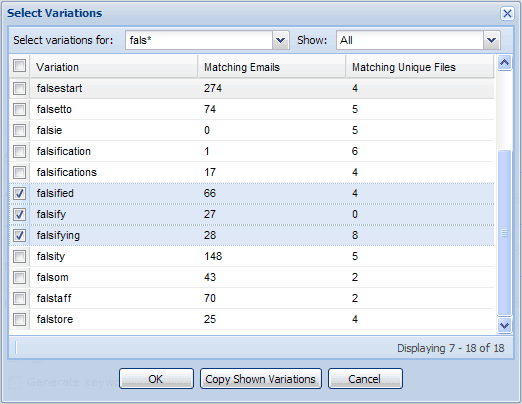Directory:E-Discovery Search
The Clearwell E-Discovery search Platform lowers processing costs and reduces review workload by rapidly searching and culling-down case datasets to only the relevant data-typically 10-20% of the original case dataset. As a result, customers review only what is relevant. Key search and cull-down features of the Clearwell E-Discovery search Platform include:
Transparent Search: Delivers a new set of search features that enable a more defensible and collaborative e-discovery search process and enhance the ability to cull irrelevant information.
Search Preview
Search Preview: Provides list of keyword variations matching your query, allowing users to selectively include and exclude certain variations.
Search Report
Automatically documents search results and refinements
* Search Preview: Provides visibility into matching keyword variations prior to running a search.Users can selectively include relevant variations or exclude false positive variations from their search query, thereby adding relevant documents and removing irrelevant documents from search results.
* Search Filters: Enable real-time search result filtering for individual queries or variations and allows users to sample the filtered documents to evaluate the effectiveness of their search as recommended by The Sedona Conference®. This also allows for a more iterative and defensible search process.
* Search Report: Creates a comprehensive report that documents all search criteria and provides detailed analytics of the results for both the overall search and the individual queries within the search. The report tracks search terms that were included and excluded during search preview, providing a defensible audit trail of search refinement decisions.
Multi-Keyword Search: Delivers the ability to run large numbers of queries simultaneously and provides reporting for both the overall search and the individual queries within the search. Large numbers of queries can be tested in minutes not days, dramatically decreasing the time needed to evaluate the effectiveness of keyword searches.
Advanced Search: Provides the ability to construct advanced searches based on custodian, sender, recipient, direction, subject, attachment names, attachment type, date range, tag, comment, folder, tag history, and processing and production batch. It supports both stemmed and unstemmed (literal) searches for English, European, and Asian languages and provides power-user capabilities including Boolean, wildcard, fuzzy, and proximity searches.
Auto-Filters: Automatically group search results by metadata fields such as tag, sender domain, sender group, sender name, recipient domain, recipient group, recipient name, document type, custodian, and language type and displays exact hit counts across the entire search result set for every filter. Users can narrow search results by simply clicking on a checkbox to cull-down the dataset to the relevant documents for detailed review.
Hit-Highlighting: Highlights search terms in messages, attachments, and files allowing users to quickly find what they are looking for. Users can simultaneously view highlighted terms from multiple searches to accelerate review (e.g., highlight terms from both privilege and responsive searches).
Know more - E-Discovery Search
electronic discovery service electronic discovery litigation support
